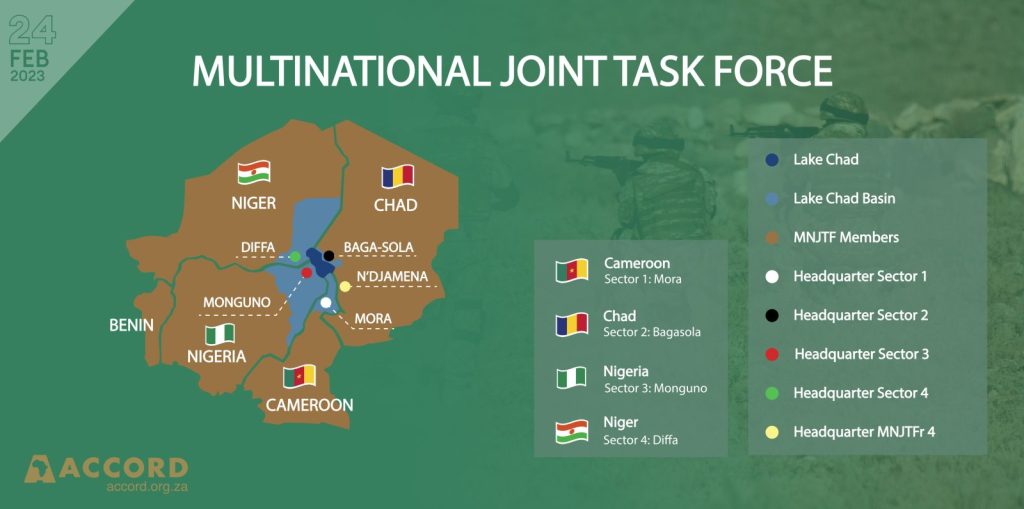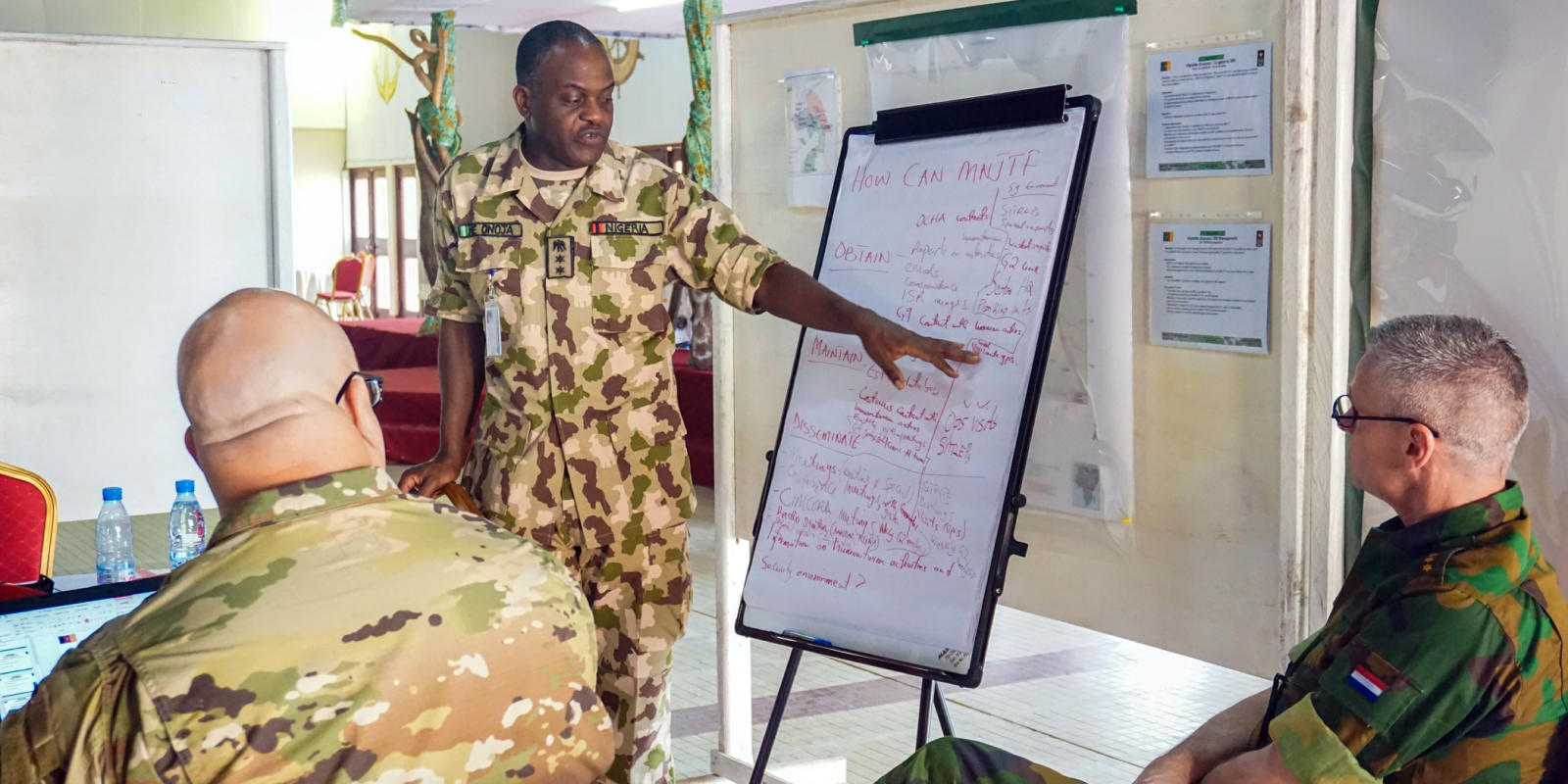The Multinational Joint Task Force (MNJTF) was re-activated in late 2014 by the Lake Chad Basin Commission (LCBC) as a regional security arrangement to fight the spreading threat of Boko Haram (BH) in the region. The African Union (AU) Peace and Security Council (PSC) authorised the operationalisation of the Force´s mandate in early 2015 and has renewed its mandate on a yearly basis since then. The Force is comprised of troops from its five Troop Contributing Countries (TCCs), namely Nigeria, Niger, Chad, Cameroon and a smaller contingent from Benin, and it is tasked with three core mandated tasks:
- To create a safe and secure environment in the areas affected by the activities of BH and other terrorist groups in order to significantly reduce violence against civilians and other abuses, including sexual and gender-based violence, in full compliance with inter- national law, including international humanitarian law and the UN Human Rights Due Diligence Policy.
- To facilitate the implementation of overall stabilisation programmes by the LCBC member states (MS) and Benin in the affected areas, including the complete restoration of state authority and the return of IDPs and refugees.
- To facilitate, within the limit of its capabilities, humanitarian operations and the delivery of assistance to the affected populations.
The efforts of the MNJTF has contributed to a decline in the number of terrorist attacks and fatalities in the region @EffectivePOps @T4PAfrica
Tweet
In order to achieve its mandate, the MNJTF is organised to operate across its Areas of Responsibility (AORs), which are divided into four sectors:

What is unique about the MNJTF in comparison to other traditional AU Peace Support Operations (PSOs) is that each TCC operates within its own borders. According to the MNJTF´s Rules of Engagement (RoE), TCCs position themselves within their borders where they conduct their own national operations. However, in situations where it may be deemed necessary, forces can conduct joint operations where they may cross up to a 25km perimeter into neighbouring territory in hot pursuit of terrorists. The MNJTF operates under the direct political leadership of the LCBC and military command of its Force Commander, responsible for coordinating all activities across the four countries.
An effective but highly under-resourced force
The overall assessment is that the MNJTF is, to a degree, effectively attaining its mandate priorities. The MNJTF has conducted 6 major operations since 2015, in which it has managed to consolidate significant gains. For example, Operation Sharan Fage in 2021 led to the neutralisation of 22 BH/ISWAP terrorists, destruction of infrastructure and equipment and the clearing of over 20 towns and villages. In 2022, during Operation Lake Sanity, several BH/ISWAP strongholds were cleared, top terrorist commanders such as Abubakar Dan Buduma were eliminated, and 4 000 civilians were freed.
The efforts of the MNJTF are also seeing a decline in the number of terrorist attacks and fatalities in the region from 8 119 in 2015 to 1 894 in 2021. This decline is also due to the surrendering of terrorists in the region – 1 711 terrorists surrendered in 2021 and 2 225 surrendered in 2022. Beyond its military efforts, the MNJTF has been able to create a conducive environment for refugees and IDPs to return home (200 00 between September 2021 and April 2022) and has remained steadfast in protecting and providing for them amidst the departure of some NGOs. In addition, the MNJTF is providing protection and a safe corridor for humanitarian actors to move and enter affected areas that they were not able to access previously. This is allowing broader affected populations to gain access to basic services and humanitarian assistance.
However, the security situation remains critical given the high adaptability and mobility of the terrorists as well as the highly volatile circumstances in the region. Although operations are successful, they cannot be sustained for long periods of time. Once the military leaves the liberated areas, there is no police capacity to be able to protect and hold the areas for stabilisation programmes to begin. This allows terrorist groups to come back and reclaim those territories, become invisible and embedded within the local population and set up their own governance structures. The military is often forced to remain present to conduct policing tasks. However, the military does not have the capacity to operate at this level, nor the resources.
The MNJTF is also facing the issue of inadequate, inconsistent, and insufficient funding and therefore it is unable to adequately plan, execute and sustain large-scale operations. Funding for the missions depends on external partners and their procurement processes or on the funding each TCC is able or willing to provide, making funding unpredictable and unreliable. A similar issue is the lack of appropriate equipment and operational equipment to conduct effective and safe operations. For instance, the MNJTF does not have appropriate counter-IED equipment, or sufficient amphibious platforms, which directly affects the movement of all personnel across the AORs. The above, coupled with the lack of long-term, substantive and specialised trainings, as well as military doctrine and language differences among the TCC´s troops is significantly hindering the effectiveness of the force. Therefore, all mission stakeholders should prioristise closing those gaps before looking at external or alternative solutions.
Role of the AU in support of the MNJTF
The MNJTF differs from other AU PSOs in the sense that it is not formally mandated by the AU PSC. As mentioned above, the AU PSC only authorised the operationalisation of the MNJTF meaning that it is not deployed by the AU and therefore it does not operate under its command and control structures. Notwithstanding, the partnership between the AU and the MNJTF is vital, not only for the validity it gives the mission, but for the political support, funding and other aspects the AU can advocate for in its behalf.
The AU has a Mission Support Team (MST) consisiting of 14 staff, located at the MNJTF´s Headquarters (HQ). The MST supports the planning, prioritising of tasks and coordinates the support from partners. This allows for the AU to be in constant communication with the mission where they are able to assess the most critical needs of the mission in order to advocate for further support. Through the AU, the MNJTF gets field and office material for the HQ, vehicles and other support from partners. For example, the EU provides, through the AU as a pre-financing body, approximately $500 000 per year ($120 000 per sector), and this is disbursed by the AU to the mission. In 2022, the AU coordinated with China the distribution of 16 armoured personnel carriers (4 per sector).
The MNJTF is also facing the issue of inadequate, inconsistent, and insufficient funding and therefore it is unable to adequately plan, execute and sustain large-scale operations @EffectivePOps @T4PAfrica
Tweet
However, there is a general sense that this support is not enough and that the AU could be doing more and playing a bigger role in helping the mission acquire more equipment and funding. In addition to this, it is widely argued that the AU should make itself more visible in its convening and overseeing powers in order to support the Regional strategy for Stabilisation, Recovery and Resilience (RS-SRR) more effectively, to coordinate efforts of all stakeholders and MS, and to ensure intelligence and experience sharing across borders.
Recommendations
In order to address the contraints the challenges faced by the MNJTF and enhance its effectiveness, the following recommendations are worth considering:
- Prioritise the development of police capacity across MS through training, rostering and experience-sharing. The PSC has called for the restructuring of the force into a more multidimensional one with civilian and police components. The debate is already taking place, however stakeholders need to take a step back and determine what can be done realistically, rather than what could ideally be done. Questions such as whether there is the capacity to deploy national police forces or whether there are enough resources and infrastructure for such deployments should be present in the debate.
- Strengthen the MNJTF´s intelligence posture by establishing an intelligence-sharing loop between the MNJTF, G5 Sahel Joint force, Accra Initiative and Nouakchott Process given the spread of terrorism beyond the LCB region; posting dedicated liaison officers to the Centre for Coordination and Liaison (CCL) to ensure optimal functioning of the regional intelligence fusion; and ramping up the capacity-building of relevant intelligence officers on how to use relevant equipment.
- Align training with core priority areas to close capacity gaps. This would include trainings on how to use newly acquired equipment such as ISR platforms or IED detectors. The AU PSC should undertake a critical needs assessment of the mission to identify the most critical training needs for the mission.
- Explore alternative means of complementary funding. In this regard, the MNJTF should explore the possibility of imposing a Peace and Stability Tax (PST) on the goods destined for cross-border trade to generate an extra percentage of complementary funds. In addition, the Head of Mission (HoM) and Executive Secretary of the LCBC should seek further support from the AU to activate the African Solidarity Initiative (ASI) to assist the activities of the RS-SRR.
- Intensify governance and developmental interventions. There is a need for all actors involded in the RS-SRR to prioritise pillars Five and Six of the strategy to properly resource the provision of socioeconomic initiatives such as youth empowerement programmes and other developmental projects, restore ties between the population and the state and improve partnerships between between the mission and CSOs.
These recommendations speak more to what could be done ideally, rather than realistically. Therefore, the question all stakeholders involved should be asking themselves is what can be done with the already available means. In other words, how could we capitalise on or use those means in a more effective way.
Mariana Llorens Zabala is a Junior Research Fellow at the Norwegian Institute of International Affairs (NUPI).
This article is a summary of the report A quest to win the hearts and minds: Assessing the Effectiveness of the Multinational Joint Task Force published by the Effectiveness of Peace Operations Network (EPON) and Training for Peace (TfP) Programme.


